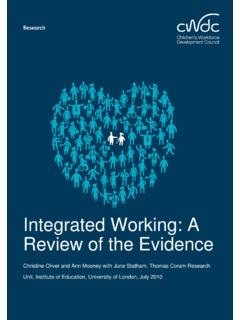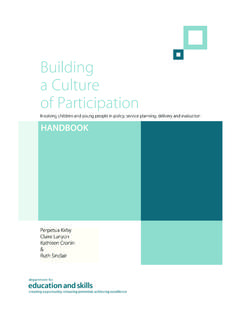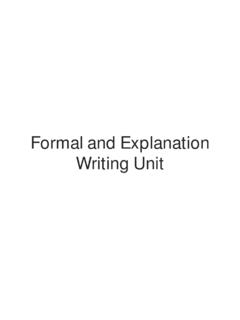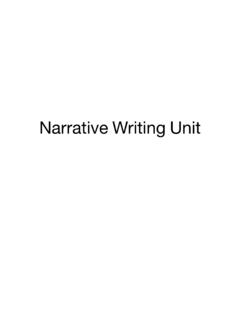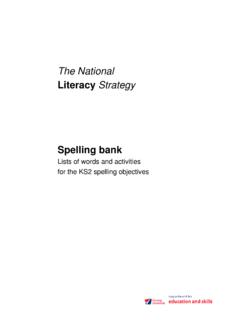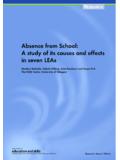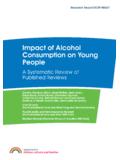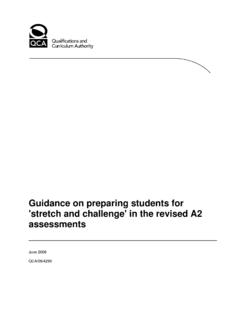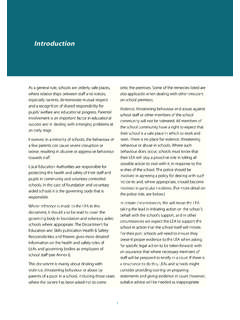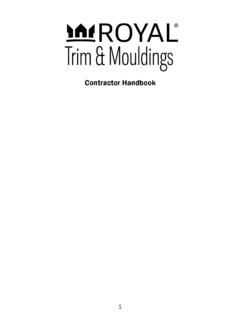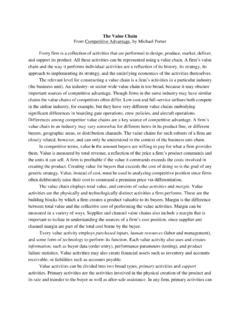Transcription of Skills for all: Proposals for a National Skills Agenda ...
1 Skills for all: Proposals for a National Skills Agenda Final Report of the National Skills Task Force ACKNOWLEDGEMENTS. From the very start of the Skills Task Force we took the view that our work should not be conducted in isolation and we have sought to consult widely throughout our programme. This approach has included consultation meetings, invitations to comment on our reports both during and after production, bi-lateral meetings with a host of agencies and the work of a supporting group of researchers with expertise in the education and training field. The scope of the consultation has been so broad as to make it impossible to list all those involved in person, or even by organisation. Nevertheless our genuine gratitude goes out to all those that have given their time and energies to contribute to the debate and our thinking as it has emerged, including those who have provided research evidence, literature surveys and position papers, and to officers of National bodies, academic institutions and Government Departments who have assisted.
2 This input has greatly enriched the process and its outcomes. Final Report of the National Skills Task Force FOREWORD. When David Blunkett invited me to chair the Skills Task Force, I was already convinced of the important contribution of Skills to productivity and social cohesion. The investigations of the Task Force since March 1997. have only served to strengthen that conviction. In this final report, we bring together the themes and recommendations of our three interim reports to help ensure that Britain has the Skills needed to sustain high levels of employment, compete in the global marketplace and provide opportunity for all. We present our Proposals for a National Skills Agenda in three sections - a set of policy actions to improve the supply side of education and training and address identified skill priorities; an approach to managing the system which will enhance the match between the employment needs of the future and the learning people pursue; and a set of targets and measures which should help us to monitor and improve our progress over time.
3 Our Agenda builds on the strengths of the existing system to create a framework that offers everyone equitable opportunities to gain the Skills they need for continuing employment. We need to create a strong ladder of learning to the very top for young people who prefer the vocational route. We must attract back into learning the majority of adults who missed out on the recent expansion of general education, and especially the one in five adults with significant basic Skills difficulties. And we must create an environment in which our small employers are more able and willing to invest in the Skills of their managers and their employees. I believe the time is right to achieve this ambitious programme of work. The Government is already putting in place many of the necessary building blocks, consistent with recommendations made in our interim reports. The new Learning and Skills Council will bring together the management and funding of general and vocational learning to promote a balanced system, and will play a critical part in putting the Skills Agenda into action.
4 With the resourcefulness and innovation of those employers and practitioners who are working to involve more people of all ages in work-related learning, we have a winning partnership to boost the productivity of our businesses and the prosperity of all our people. It has been a pleasure and an honour to work with my fellow members of the Skills Task Force, whose dedication and insight have been exemplary. We are in turn grateful to the many people who have informed and inspired us with their views and experience. The strengths of our reports owe much to them all, though any weaknesses remain ours alone. We hope that the end result of two years work is a National Agenda for Skills that will help to achieve our common vision of a high skill, high value added economy that offers opportunity to all. 3. Final Report of the National Skills Task Force Contents Acknowledgements 2. Foreword 3. Executive Summary 6. Preface 11.
5 Chapter 1. Vision for a National Skills Agenda 13. Outlines our vision for the economy and society we aspire to create through a National Skills Agenda , explaining the benefits of Skills and setting out the main objectives and goals the Agenda should encompass. - Vision 13. - Components of a National Skills Agenda 15. - Why Skills and a National Skills Agenda are important 15. Chapter 2. Assessment of main Skills gaps and shortages 18. Summarises the findings from our large programme of evidence gathering, including research on skill needs and Skills gaps, which has been conducted on our behalf. These findings provide much of the foundation for what we have to say subsequently about adapting policy. - Introduction 18. - Overview: trends in Skills demand and supply 19. - Basic Skills 22. - Generic Skills 23. - Mathematics 25. - Intermediate level Skills 26. - Information and communication technology specialist Skills 28.
6 - Major adult skill gaps 29. - Equal opportunities 30. - Conclusions 31. Chapter 3. Features of a new post-16 education and training system 33. Presents our strategy for making the changes in our education and training system which are needed to improve the supply of Skills , and in so doing pulls together recommendations from our previous reports. - Introduction 33. - Principles of foundation learning 34. - Basic Skills 35. - Generic Skills 35. 4. Final Report of the National Skills Task Force - Mathematics within broader foundation learning 37. - Improving intermediate level Skills 38. - Developing specialist Skills for the e-conomy 39. - Upgrading the Skills of adults 40. - Unemployed people and lowering recruitment difficulties 41. - Equal opportunities 42. - Conclusion 43. Chapter 4. Stimulating demand and managing the system 44. Presents our strategy for the ongoing management of the education and training system.
7 Our concern is how funding and planning systems, information and guidance, quality standards and curriculum and qualifications structures are managed on a continuing basis so as to ensure that decisions made by individuals, employers and education and training providers deliver the Skills we need. Again this builds extensively on our previous work. - Introduction 44. - A comprehensive information base 45. - Stimulating informed demand for learning 46. - Increasing employer commitment to workforce development 50. - Planning, funding and managing the system 52. - Addressing sectoral and occupational Skills shortages 56. - Information and communication technology specialist Skills 56. - The case for a stronger statutory framework 57. - Conclusion 58. Chapter 5. The way forward: priorities, targets, roles and responsibilities 59. Sets out how we see the way forward in terms of practical implementation of our Agenda .
8 This covers questions of priorities, the setting of targets and performance measures, and the roles and responsibilities of different agencies. - Introduction 59. - Priorities 60. - Skills targets 61. - Management performance measures 62. - Roles and responsibilities 63. - Conclusion 66. Annex A: Skills Task Force terms of reference and work programme 67. Annex B: Members of the Skills Task Force 68. Annex C: National Learning Targets for England for 2002 69. Annex D: National Skills Task Force publications list 70. Annex E: Definitions of attainment levels 72. 5. Final Report of the National Skills Task Force EXECUTIVE SUMMARY. Vision, goals and main components of a National Skills Agenda Our vision is one of a high skill, high value added economy delivering competitiveness and social cohesion. It is a vision in which economic and social goals are inextricably linked. Against this background we see a National Skills Agenda has having the following six goals: to successfully instil a culture of lifelong learning in the UK in which all individuals and employers recognise the importance of regular re-skilling and upskilling, and have the confidence and capacity to succeed.
9 To identify and anticipate better the evolving Skills requirements of employment, and ensure that effective information, advice and guidance enables individuals and firms to make informed choices about learning which better match those needs over time;. to ensure that everyone has the opportunity to acquire a sound foundation of the basic Skills of literacy and numeracy, key Skills and technical knowledge and Skills , which equips them properly for working life and widens opportunities for further learning and economic mobility;. to maximise the opportunities for all those in the workforce (including the temporarily unemployed) to develop new Skills and broaden their skill base so they can adapt flexibly and successfully to industry and occupational change;. to promote a proper balance between general education, vocational education and work based learning, and in particular to enhance the status and quality of vocational education and training.
10 To manage the post-16 education and training system so that we establish and maintain a sound match between Skills needs and Skills supply, and so minimise the negative economic and social impact of Skills shortages and gaps. Our proposed National Skills Agenda is designed around three core components: an action plan for changes in the curricula, qualifications, apprenticeships, funding and institutions of the post-16 education and training system to produce the required improvements in the Skills supply side', designed to tackle the priority areas of Skills deficiencies;. an approach to the continuing management of post-16 education and training, using levers such as funding, planning, labour market information, guidance and others, that shapes both the demand for, and supply of, Skills over time so minimising skill shortages and gaps in the future; and clear and explicit targets for improvements in skill levels, plus measures of our performance in managing the match between supply and demand, to raise public confidence, drive progress and monitor success.
